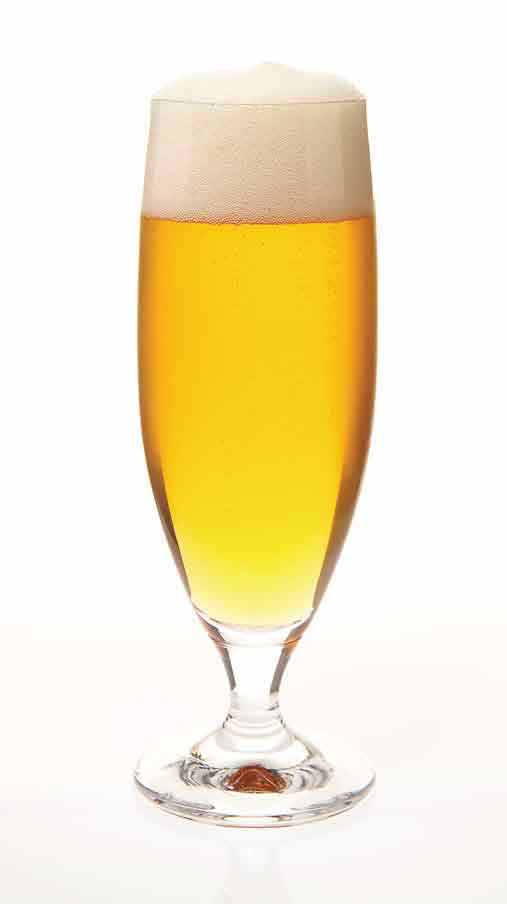Red, White and Brew Pilsner
(7.5 gallons/28 L, all-grain)
OG = 1.044 FG = 1.005
IBU = 12 SRM = 4 ABV = 5%
The recipe is brewed like a 5-gallon (19-L) batch, but after the addition of the kräusen beer and dilution water, you end up with 7.5 gallons (28 L) of beer. Your base beer (and kräusen beer) will have a gravity just over 14 °Plato (1.056) and have 16 IBUs.
Ingredients
5 lb. 14 oz. (2.7 kg) 2-row pale malt
3 lb. 14 oz. (1.8 kg) 6-row pale malt
4 lb. 2 oz. (1.9 kg) corn grits
1/4 tsp. calcium chloride (90 mins)
1 tsp. Irish moss (15 mins)
4.5 AAU Magnum hops (60 min.) (0.28 oz./8.0 g of 16% alpha acids)
0.5 AAU Saaz hops (30 mins in kräusen beer) (1/8 oz./3.5 g of 3.5 % alpha acids)
0.5 AAU Hallertau hops (30 mins in kräusen beer) (1/8 oz./3.5 g of 3.5 % alpha acids)
Wyeast 2007 (Pilsen Lager) or White Labs WLP 840 (North American Lager) yeast (3.5 qt./~3.5 L yeast starter)
Step by Step
Reserve a handful of 6-row malt. Mash in remaining barley malts by combining crushed malts with 4.5 gallons (17 L) of water at 133 °F (56 °C) in your kettle and begin mashing at 122 °F (50 °C). Combine corn grits and handful of 6-row malt with 1.5 gallons (5.7 L) of water in a large kitchen pot and begin heating cereal mash to 158 °F (70 °C). Rest cereal mash at 158 °F (70 °C) for 5 minutes, then bring to a boil. Boil for 30 minutes. (The cereal mash will need to be stirred almost constantly while being heated and boiled.)
After boiling the cereal mash for about 5 minutes, begin heating the main mash to 140 °F (60 °C) at a rate of about 2 °F (~1 °C) per minute. Hold main mash at 140 °F (60 °C), once that temperature is reached. Stir main mash while heating to prevent scorching. When cereal mash is done boiling, combine with main mash (at 140 °F/60 °C) and adjust temperature — if needed — to 153 °F (67 °C). Keep mash at 153 °F (67 °C) for 20 minutes, then begin performing an iodine test every 5 minutes.
When iodine test is negative (no color change to blue or purple), begin heating mash to 168 °F (76 °C). Transfer mash to lauter tun, let mash settle for 5 minutes, then recirculate wort for 20 minutes (or until substantially clear). Sparge with water hot enough to keep grain bed at 170 °F (77 °C ) and collect about 5 gallons (19 L) of wort, add 2.5 gallons (9.5 L) of water and bring to a rolling boil.
Once wort comes to a boil, stir in 1/4 tsp of calcium chloride and then remove 1 gallon (3.8 L) of wort and place it in a covered pot to cool. This will be your kräusen wort you will use later. Once wort cools, siphon to a 1.0-gallon (3.8 L) jug and refrigerate until needed.
Boil the remaining 6.5 gallons (25 L) of wort down to 5.0 gallons (19 L) over 90 minutes, adding single hop addition at 60 minutes left in boil. Add Irish moss with 15 minutes left in boil. Cool wort down to 48 °F (8.8 °C) and transfer wort to fermenter, leaving behind as much trub as you reasonably can. Aerate wort with a 60-second shot of oxygen and pitch all but about two tablespoons of yeast sediment from yeast starter. Refrigerate remaining yeast sediment in an air-tight container (like a White Labs yeast tube).
Ferment beer at 52 °F (11 °C). When fermentation slows greatly, prepare kräusen beer. To do this, take the 1.0 gallon (3.8 L) of wort you reserved, add the kräusen hops and boil for 30 minutes, shooting for 0.75 gallons (2.8 L) of post-boil wort. Cool kräusen wort to 52 °F (11 °C), siphon to sanitized 1.0-gallon (3.8-L) jug, aerate and pitch with remaining yeast. Let kräusen beer begin fermenting and come to high kräusen. Add kräusen beer to main batch of beer and let fermentation finish at 52 °F (11 °C).
After the fermentation is finished, separate beer from yeast and cool to 40 °F (4.4 °C). Allow to cold condition (lager) for 5–6 weeks. When you are ready to keg the beer, boil 2 gallons (7.6 L) of water down to 1.75 gallons (6.6 L) and cool rapidly. Add two-thirds of the dilution water — a little over 4.5 quarts, or 4.4 L — to a 5-gallon (19-L) Corny keg and the remaining third of the water to a second Corny keg. (Use a 3.0-gallon (11-L) keg, if you have one, for the second keg.) Transfer beer to first keg until it is full, then transfer remaining beer to second keg. Seal kegs, purge their headspaces and force carbonate to 2.6 volumes of CO2.
(Option: You can choose not to dilute the beer going to the second keg and have about 1.9 gallons (7.3 L) of strong beer or “malt liquor.”)
Written by Chris Colby

This is a modern American Pilsner, though not an attempt to clone any particular brand.


